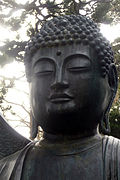
Back بوذية علمانية Arabic নাস্তিক বৌদ্ধধর্ম Bengali/Bangla Budisme laic Catalan Sekulær buddhisme Danish Säkularer Buddhismus German Budismo laico Spanish Bouddhisme séculier French Buddhisme sekuler ID Świecki buddyzm Polish Светский буддизм Russian
| Part of a series on |
| Buddhism |
|---|
 |
| Part of a series on |
| Western Buddhism |
|---|
 |
| Part of a series on |
| Nontheistic religion |
|---|
Secular Buddhism, also called agnostic Buddhism[1] and naturalistic Buddhism, is a modern, western[2][3] movement[2] within Buddhism that leans toward an "exclusive humanism" that rejects "superhuman agencies and supernatural processes"[4][1] and religious transcendence.[5][6] It developed as a response to traditional Buddhism, and to the modernised versions of Buddhism which were popularized in the west, but contained traditional elements deemed incompatible with western scientific rationalism and egalitarian humanistic values.
Secular Buddhism embraces skepticism, humanist values, a "full human flourishing,"[4] and/or a morality embedded in the natural order. It values personal and social development,[7] with Ambedkar's interpretation of Buddhism considered a branch of engaged Buddhism.[8]
- ^ a b Manitoba 2025, p. 194.
- ^ a b Higgins 2012, p. 110.
- ^ Weber 2013.
- ^ a b Higgins 2012, p. 111.
- ^ Bodhi 2021, p. 166-167.
- ^ Higgins 2012, p. 123.
- ^ Manitoba 2025.
- ^ Hennigar 2021, p. 202.
© MMXXIII Rich X Search. We shall prevail. All rights reserved. Rich X Search